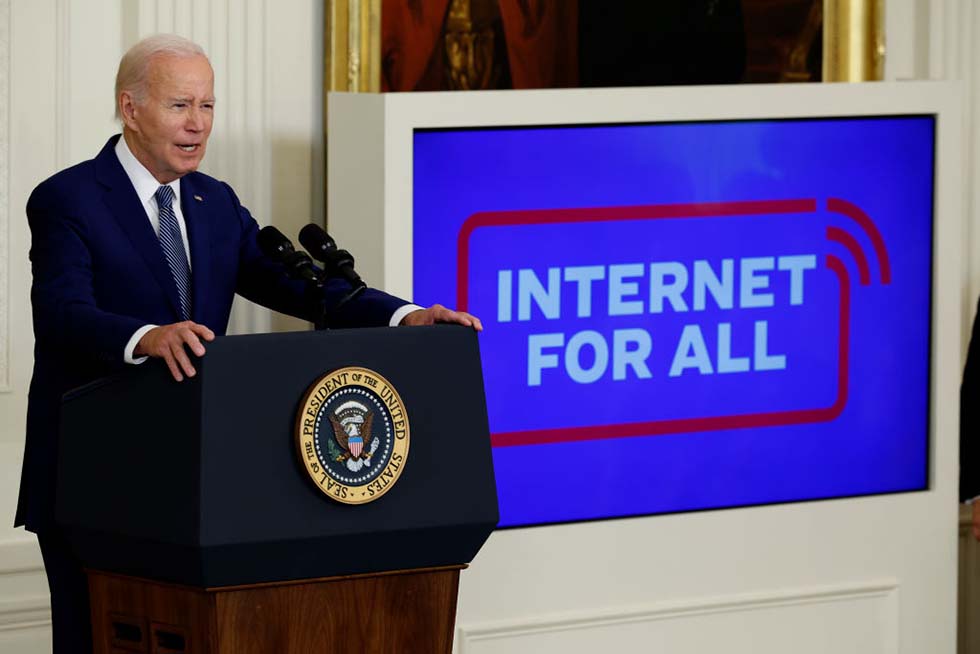
The Biden administration has figured out where it will be allocating $42.45 billion in Broadband Equity, Access and Deployment (BEAD) program subsidy money among the states and territories.
Legislators were already touting their states’ shares even as the funding allocation was being announced.
Congress provided $65 billion in the Infrastructure Investment and Jobs Act (IIJA) for broadband infrastructure. The National Technology and Information Administration (NTIA) is overseeing $48.2 billion of that, mostly going to states via the BEAD program. No state got less than $100 million and over a third--`19-got over a billion dollars.
The Biden Administration has suggested it favors fiber over wireless for the money, but is allowing for technology flexibility so long as it meets baseline high-speed and quality standards.
President Joe Biden has made universal high-speed broadband access by 2030 a priority of his administration.
The Adminisration appeared confident that the funding was all that it would take to reach its goal. "With these allocations and other Biden administration investments, all 50 states, DC, and the territories now have the resources to connect every resident and small business to reliable, affordable high-speed internet by 2030," the White house said in a statement.
The money is being allocated with the aid of the FCC’s updated Broadband Availability Map.
Texas topped NTIA’s list of available subsidy money with $3.17 billion, followed by California with $1.86 billion and Missouri with $1.736 billion.
The funding will initially go to deploy and upgrade broadband networks, then of there is any left over it can go to access, adoption or equity-related issues.
Also Read: White House Issues State Guide to Broadband Billions
States will get formal notice of their allocations on June 30, but the White House wasn’t waiting to spread the good news.
Now that the money has been allocated, the broadband subsidy gold rush — in other words, formal proposals from eligible broadband providers — can be submitted beginning July 1.
“From the Berkshires to the Cape, this federal funding will help Massachusetts’s unserved and underserved households stay connected with loved ones, apply for jobs, and access health care and other online resources,” Sen. Ed Markey (D-Mass.) said of his state’s $147 billion.
“Today’s digital era has made clear that an internet connection is a necessity for New Mexico families," said Sen. Ben Ray Lujan (D-N.M.). "It’s needed in order for students to complete their studies, for families to access work and telehealth services, and for small businesses to get ahead,” said Luján. “That’s why I’m proud to work alongside NTIA to deliver this pivotal investment of $675 million to help deliver a reliable internet connection to families across New Mexico."
“With today’s funding allocations, the Biden Administration has taken another major step in bringing high-performance broadband to all Americans,” said Grant Spellmeyer, president and CEO of ACA Connects, which represents smaller independent cable operators. “The ball is now in the States, and ACA Connects members — who already offer wireline broadband service to millions of households, including in rural communities — are eager to work with them to fulfill the promise of the BEAD program.”
Also Read: FCC's New Broadband Map Still Work in Progress
Zachary Cikanek, executive director of Connect the Future, whose members include cable operator Charter Communications and wireless internet service providers, said: “Significant private and public investments in broadband, including the $42.45 billion BEAD program dedicated to expanding connectivity, represent a once-in-a-generation opportunity to connect every unserved American to reliable, high-speed internet. Now we have to make certain those funds are put to use effectively to bridge our nation’s digital divide. That means eliminating the obstacles that stand in the way of swift, efficient deployment, such as pole access issues, so that critical broadband deployment funding is not stranded.”
"Important details remain, however, which require ironing out for BEAD to quickly and efficiently realize its goals," said David Zumwalt, President of WISPA – Broadband Without Boundaries. "All solutions should be on the table. Pernicious and wasteful overbuilding must be strenuously avoided. Access to the state grant process should work to truly invite small players so more answers can be brought to bear on this national challenge. Clarifying these and other matters will improve the program for all involved, especially those who lack broadband.
“CCA congratulates the Biden Administration for allocating BEAD funding ahead of schedule,” said Competitive Carriers Association president and CEO Tim Donovan. "As more detailed planning for BEAD projects moves forward, all technologies — including wireless solutions — will be needed to successfully complete efforts to close the digital divide.”
“Today’s state allocation announcement is an important step in our work to close the digital divide. Especially now that these resources have been allocated, we need to make sure that the funds are used to connect every American,” House Energy and Commerce Committee chair Cathy McMorris Rodgers (R-Wash.) and Communications Subcommittee Chair Bob Latta (R-Ohio) said. “Energy and Commerce will continue our oversight to make sure National Telecommunications and Information Administration (NTIA) is carrying out its responsibilities according to congressional intent, which includes making those investments in a technology-neutral way that avoids overbuilding and other wasteful spending. That is how we make sure every unserved American has access to affordable, reliable broadband services.”
“Today’s announcement is history in the making," said House E&C ranking member Frank Pallone Jr. (D-N.J.). “Reliable, high-speed internet is not a luxury ± it’s a necessity. Americans depend on internet access to do their jobs, run their small businesses, complete schoolwork, and connect with family and friends. That’s why we delivered for the American people with the Bipartisan Infrastructure Law, which included a $42.45 billion investment in broadband buildout, and I am pleased the Biden administration has announced the funding allocations for the states and territories.
“And with the FCC releasing the new National Broadband Map last month, we are well prepared to ensure these unprecedented high-speed internet investments will reach unserved and underserved communities nationwide that have been left behind for too long,” Pallone said.







